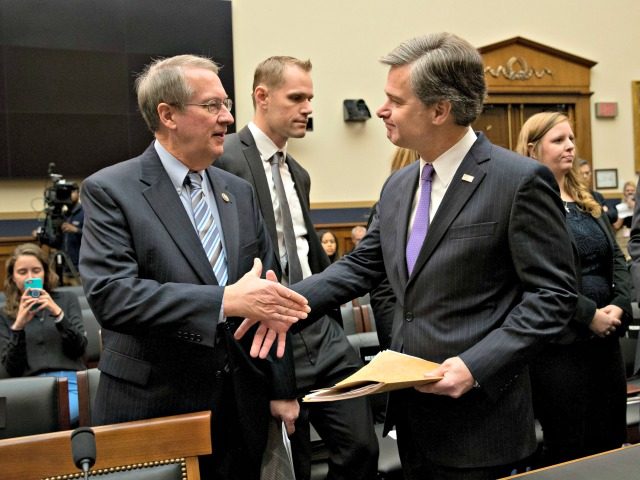The Department of Justice (DOJ) released a letter on Tuesday from Assistant Attorney General Steven Boyd to House Judiciary Committee Chairman Bob Goodlatte (R-VA), officially acknowledging for the first time the subpoena the committee sent the DOJ.
The letter was accompanied by one from FBI Director Christopher Wray, confirming that he has doubled the number of FBI staff working full time in two shifts to produce the documents Goodlatte and his committee requested – from 27 to 54.
AAG Boyd, head of DOJ’s Office of Legislative Affairs – the main DOJ organ that works with Congress – writes to Goodlatte acknowledging the House Judiciary Committee’s demands for reams of documents related to the FBI investigations into Russian interference in the 2016 elections and Hillary Clinton’s private email server, the FBI Office of Professional Responsibility determination that led to FBI Deputy Director Andrew McCabe’s firing, the Foreign Intelligence Surveillance Court (FISC) applications regarding Carter Page, and several other matters.
The letter’s release comes after an extended media campaign implying the Department of Justice is slow-rolling its release of information to the House Judiciary Committee. Goodlatte himself announced his subpoena last week, saying in a statement, “Given the Department’s ongoing delays in producing these documents, I was left with no choice but to issue a subpoena on March 22 to compel DOJ to hand over the documents.”
Boyd’s letter pushes back on this narrative, claiming DOJ has been responsive since November, when the committee first requested the documents in question. “Since the Committee first requested these documents in November 2017, approximately twenty-seven FBI staff have been working to produce responsive documents on a rolling basis,” the letter reads. “As you know, the Department and the FBI have been producing documents to the Committee every 10 to 14 days.”
“We are expeditiously reviewing the remaining documents to determine whether they are responsive,” Boyd writes, referencing the doubling of staff at the FBI to handle the response.
Later, the letter seems to hit back harder, claiming, “In the subpoena, certain categories of documents are requested for the first time, a significant deviation from the traditional method of accommodating congressional requests for information without compulsory process.”
The requests regarding McCabe are referenced as examples.
Elsewhere, the letter stresses it is repeating reasons why DOJ will not give Goodlatte’s committee certain materials. For example, Goodlatte’s subpoena requests “The document referenced by James Rybicki during his January 18, 2018 interview with the Committee referring or relating to court cases or judicial decisions used in considering, justifying, or communicating possible charges against, or decisions not to charge, Clinton.”
“The Department has previously communicated to the Committee that the document referenced in Paragraph 3 of the Schedule is a memorandum authored by an attorney,” Boyd replies, explaining that the attorney-client privilege and the work-product doctrine prohibit disclosure.

COMMENTS
Please let us know if you're having issues with commenting.